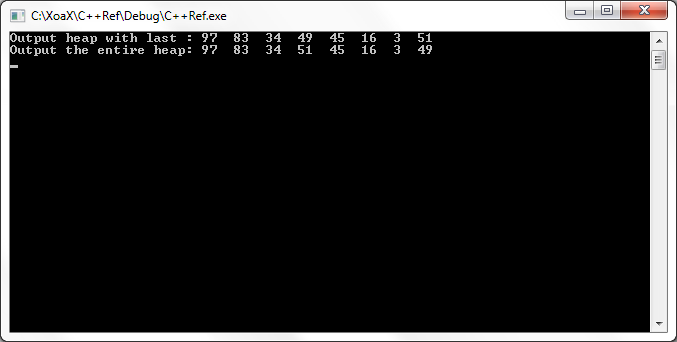algorithm - STL C++
push_heap()
Declaration
template <class RandomAccessIterator> void push_heap( RandomAccessIterator xFirst, RandomAccessIterator xLast );
Description
This function pushes the element pointed to by "xLast" into the heap defined by the elements in the range "xFirst" up through the one before "xLast." The result is a heap that is one element longer than it was. The overloaded version uses the function "xComp" as a less than comparison function.Header Include
#include <algorithm>
Overloads
template <class RandomAccessIterator, class BinaryPred> void push_heap( RandomAccessIterator xFirst, RandomAccessIterator xLast, BinaryPred xComp );
Example
#include <iostream>
#include <vector>
#include <algorithm>
int main()
{
using namespace std;
// Create a vector instance
vector<int> qV;
qV.push_back(45);
qV.push_back(83);
qV.push_back(3);
qV.push_back(49);
qV.push_back(97);
qV.push_back(16);
qV.push_back(34);
// Make the vector a heap
make_heap(qV.begin(), qV.end());
// Add an extra element to the end of the heap
qV.push_back(51);
vector<int>::iterator qIter;
// Output the heap and last element
cout << "Output heap with last : ";
for (qIter = qV.begin(); qIter != qV.end(); ++qIter) {
cout << *qIter << " ";
}
cout << endl;
// push the last int (51) into the heap
push_heap(qV.begin(), qV.end());
// Output the new vector
cout << "Output the entire heap: ";
for (qIter = qV.begin(); qIter != qV.end(); ++qIter) {
cout << *qIter << " ";
}
cout << endl;
// Keep the window open
cin.get();
return 0;
}Output

© 2007–2024 XoaX.net LLC. All rights reserved.
